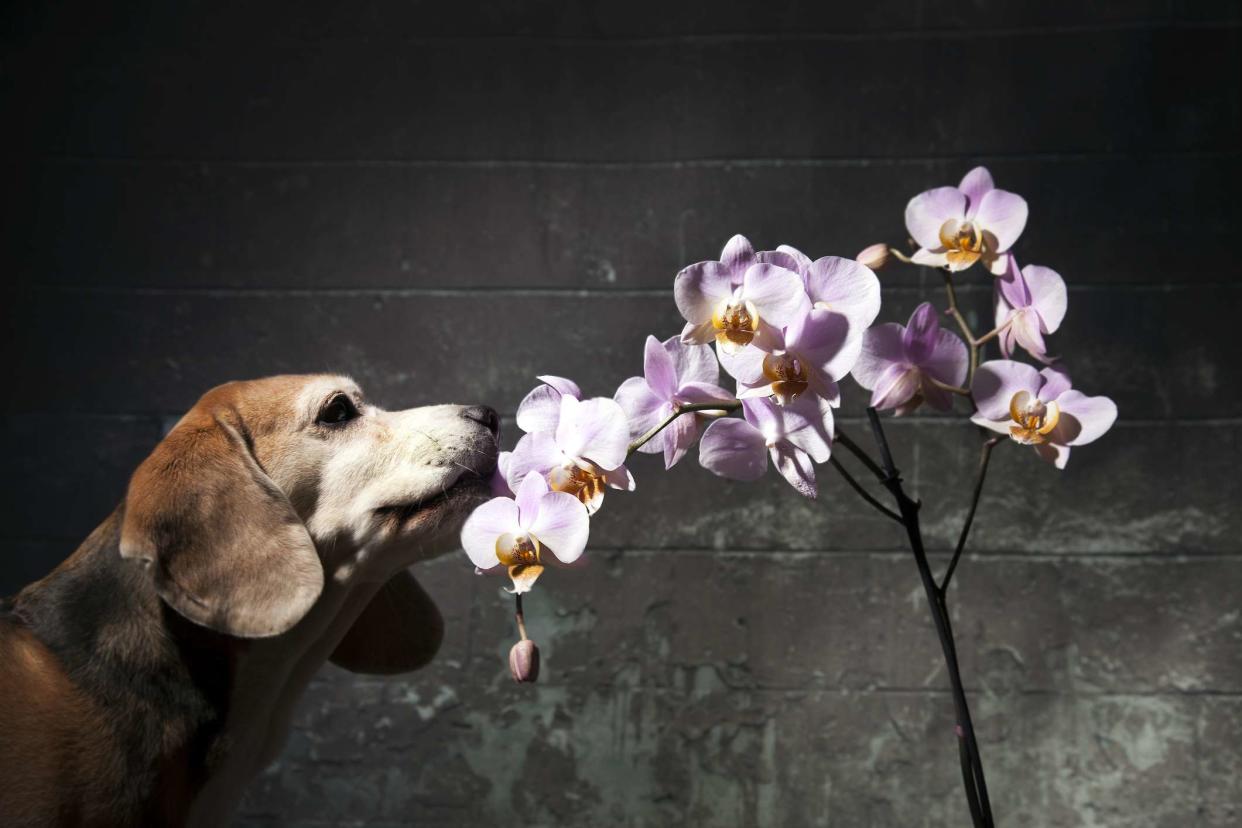Are Orchids Toxic to Dogs? Everything You Need to Know

mashabuba / Getty Images
When you have a pup that’s a notorious nibble, selecting pet-friendly plants is a priority. After all, the ASPCA lists plants as a top toxin for pets. If you plan to add an exotic Phalaenopsis to your houseplant collection, you’ll want to understand if orchids are toxic to dogs.
Fortunately, most orchids aren’t toxic to cats or dogs. However, taking steps to discourage your dog from devouring any plants in your home is a sensible precaution.
Orchids Explained
Orchids are one of the most popular houseplants—for good reason.These exotic beauties remain in bloom for a long time, make great additions to cut flower arrangements, and many sought-after orchid species, like the Phalaenopsis, aren’t too tricky to care for.
Generally, indoor orchid care involves providing a warm, humid position out of direct sunlight.
Are Orchids Toxic to Dogs?
A big bonus of cultivating these fascinating flowers is that most orchids are not toxic to dogs. The ASPCA lists the most popular orchid genus, Phalaenopsis, as non-toxic to dogs and cats.
However, there are over 25,000 species within the Orchidaceae family. Although there aren’t reports or studies to evidence any orchids being majorly problematic for dogs if they ingest them, there could be untested species or hybrids that present a risk. If you are introducing a rare orchid into your collection, it’s always worth being extra cautious when you have pets in the household.
Also, while lady’s slipper orchids (Cypripedium spp.) aren’t listed as toxic to pets, be aware they are known to cause mild skin irritation in humans. They could cause a similar reaction in dogs that come into contact with them.
Why It’s Not Good For Your Dog to Ingest Orchids
Just because orchids are not toxic to dogs, that doesn’t mean you should let your pooch have free rein to munch on them or any other plant. Orchids don’t tend to have bountiful blooms, and it would be a shame to lose the ones you have carefully cared for in a single chomp.
Plus, plants that are non-toxic for dogs can still lead to upset stomachs, vomiting, and diarrhea when eaten regularly or in large enough quantities.
And it’s not just the plants themselves that can cause a problem. If your dog gobbles up a lot of orchid bark, it can expand in their tummy and cause an intestinal blockage. Then there’s the risk that the plants have been treated with pesticides or herbicides that are toxic to dogs. Chemical fertilizers can also be a problem. However, fertilizing your orchid with an organic, pet-safe solution, like fish emulsion, reduces this concern.
How to Prevent Your Dog From Eating Your Orchid
Dogs can eat orchids or other plants for a variety of reasons. Plant eating is a common instinctual behavior in dogs, with some individuals being drawn to the habit more than others.
If your dog is a big grass eater, they might be more likely to want to munch on houseplants. Other dogs might turn to eating your orchids or other houseplants as a form of play, out of curiosity, or if they are bored or need to relieve stress. Tackling any underlying issues and protecting your plants keeps your pup and plants safe.
Here are some savvy strategies to prevent your dog from eating your orchids:
Pet-proof your plants: Keep orchids out of your dog's reach on plant shelves, in hanging baskets or in a pet-free plant room.
Increase enrichment: If your dog is bored, providing more physical and mental stimulation will make them less likely to find other forms of amusement—like eating your orchids.
Address anxiety: If your dog is feeling stressed, they can turn to chewing in an attempt to relieve their anxiety. Observe your dog’s behavior and body language, and contact a certified canine behaviorist if you need support to identify triggers and help them relax.
Frequently Asked Questions
What happens if your dog eats an orchid?
If your dog eats a couple of petals of your orchid, it won’t usually be a cause for panic. However, if they have eaten many plant stems or petals, watch closely for any concerning signs. Contact your veterinarian if they have an upset stomach, vomiting, diarrhea, or any other unusual changes in behavior.
Which orchids are safe for dogs?
There are lots of orchid species to choose from. While there are no reports of any being toxic to dogs, many rare orchids won’t have been tested. If you want to err on the side of caution, select an orchid from the Phalaenopsis genus.
What are the most toxic plants for dogs?
One of the most common, highly toxic plants for dogs is the sago palm.All parts of the plant are toxic, but the seeds and nuts are the most potent. Ingestion of even just a few seeds can lead to liver failure. Some other high-risk species include foxgloves, castor bean plants, and larkspurs. Always check a plant’s toxicity before bringing it into your home or yard. Fortunately, there are also many pet-friendly plant species to choose from.
Read the original article on The Spruce.

